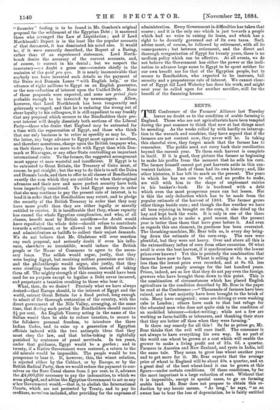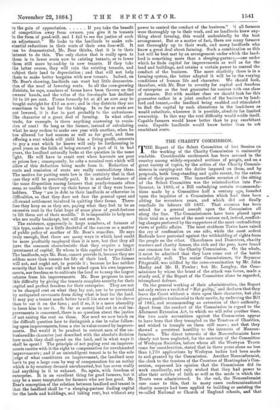RENTS. T HE Conference of the Farmers' Alliance last Tuesday leaves
no doubt as to the condition of arable farming in England. Those who are not agriculturists have been tempted during the past summer to think that now at last things must be mending. As the weeks rolled by with hardly an interrup- tion to the warmth and sunshine, they have argued that if the farmers are not content now, they never will be. In taking this cheerful view, they forgot much that the farmer has to remember. The public need not carry back their recollection beyond the current year. To them each harvest is complete in itself. If it is good, they picture the farmer as beginning to make his profits from the moment that he sells his corn. The farmer himself cannot put past harvests aside in this con- venient fashion. Each of them had its own history; and, like other histories, it has left its mark on the present. The years in which he has no corn to sell, and no profits to make, are still with him in the shape of unpleasant entries in his banker's -book. He is burdened with a debt which even the most prosperous years can but lessen. Nor is this the only deduction which has to be made from the popular estimate of the harvest of 1884. The farmer grows other things beside corn ; and though the fine weather we have all been rejoicing in brought on the corn, it also dried up the hay and kept back the roots. It is only in one of the three elements which go to make a good season that the present year is better than those that have gone before it. And even as regards this one element, its goodness has been overrated. The thrashing-machine, Mr. Bear tells us, is every day bring- ing down the estimate of the corn-crop. The ears were. plentiful, but they were not heavy. Over and above all this is the extraordinary influx of corn from other countries. Of what avail is even the best harvest, if it synchronises with the lowest prices ever known? Yet this is precisely the combination that farmers have now to face. Wheat is selling at 4s. a quarter less than the lowest price ever recorded, and at 8s. 6d. less than the lowest yearly average for the last hundred years. Prices, indeed, are so low that they do not pay even the foreign growers who have brought them down to this point. This is the combination of circumstances which has placed English agriculture in the condition described by Mr. Bear in the paper he read at the Conference :—" Thousands of farmers have been ruined, and a vast majority have been brought to the brink of ruin. Many have emigrated ; some are driving or even washing cabs in London ; others have sunk to that last refuge for the educated man who does not quite sink to the condition of an unskilled labourer—ticket-writing; while not a few are working as farm-bailiffs or labourers, and thanking their stars that they are better off than when they were farming."
Is there any remedy for all this ? So far as prices go, Mr. Bear thinks that the evil will cure itself. The consumer is not always to have everything his own way. In no part of the world can wheat be grown at a cost which will enable the grower to make a living profit out of 31s. 6d. a quarter. Farmers in America and New Zealand, and ryots in India, tell the same tale. They mean to grow less wheat another year and to get more for it. Mr. Bear expects that the average price of wheat in England will be about 40s. a quarter, and on a great deal of the best wheat-land it can be grown at this figure—under certain conditions. Of these conditions, by far the most important is a large reduction of rent. Without that it is impossible, except in special cases, to go on farming arable land. Mr. Bear does not propose to obtain this re- duction by any heroic means. "As long," he says, "as an owner has to bear the loss of depreciation, he is fairly entitled
to the gain of appreciation If you take the benefit of competition away from owners, you give it to tenants in the form of good-will, and I fail to see the justice of such an adjustment." He looks to the landlords to make sub- stantial reductions in their rents of their own free-will. It can be demonstrated, Mr. Bear thinks, that it is to their interest to do this. The only choice that is really open to them is to lower rents now to existing tenants, or to lower them still more by-and-by to new tenants. If they take the latter course, they will ruin the existing tenants, and subject their land to depreciation ; and that will not help them to make better bargains with new tenants. Indeed, on Mr. Bear's showing, landlords can want but little demonstra- tion of the need of lowering rents. In all the corn-growing districts, he says, numbers of farms have been thrown on the owners' hands, and the value of the fee-simple has declined 30 to 50 per cent. Farms formerly let at £1 an acre may be bought outright for £12 an acre; and in clay districts they are sometimes to be had for the taking. In so far as rents are not lowered, it is due in- part probably to the unbusiness- like character of a great deal of farming. In what other trade, for example, is there anything answering to remis- sion of rent? So long as the farmer, instead of calculating what he may reckon to make one year with another, when he has allowed for bad seasons as well as for good, and then offering a rent which will yield him a living profit, consents to pay a rent which he knows will only be forthcoming in good years on the faith of being excused a part of it in bad years, the landlord naturally looks at the question in the same light. He will have to remit rent when harvests are poor or prices low ; consequently, he asks a nominal rent which will allow of this deduction being made from it. Redaction of rents and remission of rents are really contradictory ideas. The motive for putting rents low is the certainty that in that case they will be punctually paid. It is another instance of the same disposition among farmers that yearly-tenants often seem as unable to throw up their farms as if they were lease- holders. They "are in debt to their landlords or otherwise in difficulties, so that they dare not face the general upset and all-round settlement involved in quitting their farms. There- fore they keep on as they are, paying what they feel to be an excessive rent in the faint hope of some piece of good-fortune to lift them out of their muddle." It is impossible to help men who are really bankrupt, but will not own it.
The existence, apparently in large numbers, of farmers of this type, makes us a little doubtful of the success as a matter of public policy of another of Mr. Bear's remedies. He says truly enough, that there are many ways in which land could be more profitably employed than it is now, but that they all have the common characteristic that they require a larger investment of capital. By whom is this capital to be provided ? The landlords, says Mr. Bear, cannot provide it, because they are seldom more than tenants for life of their land. The farmer will not, and ought not, to provide it ; because he has neither security that his rent will not be raised upon his own improve- ments, nor freedom so to cultivate the land as to reap the largest returns from his improvements. Mr. Bear proposes to meet this difficulty by giving the tenants complete security for their capital and perfect freedom for their enterprise. They are not to be charged rent on what they lay out, nor to be prevented by antiquated covenants from doing what is best for the land. It may pay a tenant much better to sell his straw or his clover than to use it on the farm ; and if so, it is a mere absurdity to force him to use it. So far as money laid out in real im- provements is concerned, there is no question about the justice of not raising the rent on them. Nor need we now touch on the difficult question how to distinguish a rise in value follow- ing upon improvements, from a rise in value caused by improve- ments. But would it be prudent to entrust men of the un- businesslike character just described with the absolute decision bow much they shall spend on the land, and in what ways it shall be spent ? The principle of not paying rent on improve- ments carries with it the right to compensation for unexhausted improvements ; and if an unintelligent tenant is to be the sole judge of what constitutes an improvement, the landlord may have to pay a large sum by way of compensation for an outlay which is by courtesy deemed unexhausted, but has never really had anything in it to exhaust. So, again, with freedom of enterprise. It is an excellent thing for good farmers, but it may be a mere temptation for farmers who are less good. Mr. Bear's conception of the relation between landlord and tenant is that the landlord shall be "a sleeping-partner finding capital for the lands and buildings, and taking rent, but without any
power to control the conduct of the business." If all farmers were thoroughly up to their work, and no landlords knew any- thing about farming, this would undoubtedly be the best arrangement. But as a matter of fact, there are many farmers not thoroughly up to their work, and many landlords who know a great deal about farming. Such a combination as this last will be best met by an arrangement under which the land- lord is something more than a sleeping-partner,—one under which he finds capital for improvements as well as for the land and buildings, and retains a certain power to control the conduct of the business. The more elasticity there is in a farming system, the better adapted it will be to the varying conditions of human life and character. We should look, therefore, with Mr. Bear to security for capital and freedom of enterprise as the best guarantee for success with one class of farmers. But with another class we should look for this guarantee rather in a joint conduct of the business by land- lord and tenant,—the landlord being enabled and stimulated to find the capital by such alterations in the land-laws as would substitute, wherever it is possible, absolute for limited ownership. In this way the rent difficulty would settle itself. Capable farmers would know better than to pay exorbitant rents. Capable landlords would know better than to ask exorbitant rents.



































 Previous page
Previous page